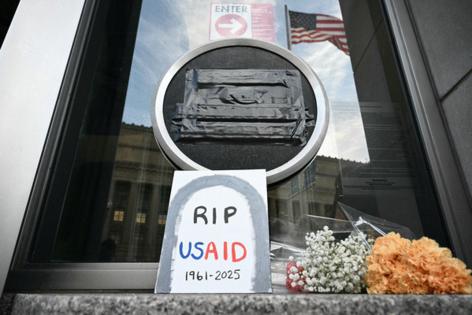Court lets Trump block billions of dollars in foreign aid
Published in Political News
WASHINGTON — The Trump administration can cut billions of dollars in foreign assistance funds approved by Congress for this year, a U.S. appeals court ruled.
In a 2-1 decision on Wednesday, the appellate panel reversed a Washington federal judge who found that U.S. officials were violating the Constitution’s separation of powers principles by failing to authorize the money to be paid in line with what the legislative branch directed.
The ruling is a significant win for President Donald Trump’s efforts to dissolve the U.S. Agency for International Development and broadly withhold funding from programs that have fallen out of favor with his administration, regardless of how Congress exercised its authority over spending. Trump’s critics have assailed what they’ve described as a far-reaching power grab by the executive branch.
The nonprofits and business that sued could ask all of the active judges on the U.S. Court of Appeals for the DC Circuit to reconsider the three-member panel’s decision. If the panel’s decision stands, it wasn’t immediately clear how much it would affect other lawsuits contesting a range of Trump administration funding freezes and cuts besides foreign aid.
Judge Karen LeCraft Henderson wrote in the majority opinion that the challengers lacked valid legal grounds to sue over the Trump administration’s decision to withhold the funds, also known as impoundment. The U.S. Comptroller General — who leads an accountability arm of Congress — could sue under a specific law related to impoundment decisions, Henderson wrote, but the challengers couldn’t bring a “freestanding” constitutional claim or claim violations of a different law related to agency actions.
Henderson, appointed by former President George H.W. Bush, was joined by Judge Greg Katsas, a Trump appointee. The court didn’t reach the core question of whether the administration’s unilateral decision to refuse to spend money appropriated by Congress is constitutional.
Judge Florence Pan, nominated by former President Joe Biden, dissented, writing that her colleagues had turned “a blind eye to the ‘serious implications’ of this case for the rule of law and the very structure of our government.”
White House spokesperson Anna Kelly said in a statement that the appeals court “has affirmed what we already knew – President Trump has the executive authority to execute his own foreign policy, which includes ensuring that all foreign assistance aligns with the America First agenda.”
A lead attorney for the grant recipients did not immediately respond to a request for comment.
The two consolidated cases before the appeals court only deal with money that Congress approved for the 2024 fiscal year, which ends on Sept. 30. Grantees are poised to lose access to funds if they haven’t yet been approved to be spent by federal officials — a precursor to actual payouts — or unless a court order is in place.
The administration lost one of its few battles before the U.S. Supreme Court earlier this year in the foreign aid fight. In March, a majority of justices refused to immediately stop U.S. District Judge Amir Ali’s injunction taking effect while the legal fight went forward.
Since then, however, the challengers have filed complaints with Ali that the administration is failing to obligate or pay out the funds. They’ve rebuffed the government’s position that the delay is part of a legitimate effort to “evaluate the appropriate next steps” and accused officials of angling to use a novel tactic to go around Congress in order to cut appropriated money.
The Trump administration has dramatically scaled back the U.S. government’s humanitarian work overseas, slashing spending and personnel and merging the USAID into the State Department.
The challengers say the foreign aid freeze has created a global crisis, and that the money is critical for malaria prevention, to address child malnutrition and provide postnatal care for newborns. The groups argued that the president and agency leaders couldn’t defy Congress’ spending mandates and didn’t have discretion to decide that only some, let alone none, of the money appropriated by lawmakers should be paid.
The president can ask Congress to withdraw appropriations but can’t do it on his own, the challengers argued.
The Justice Department argued Ali’s order was an “improper judicial intrusion into matters left to the political branches” and that the judge wrongly interfered in the “particularly sensitive area of foreign relations.” The government also said that the Impoundment Control Act, which restricts the president from overruling Congress’ spending decisions, wasn’t a law that the nonprofits and business could sue to enforce.
The challengers countered that Ali’s order blocking the funding freeze was rooted in their constitutional separation-of-powers claim, not the impoundment law.
The cases are Global Health Council v. Trump, 25-5097, and AIDS Vaccine Advocacy Coalition v. U.S. Department of State, 25-5098, U.S. Court of Appeals, DC Circuit.
©2025 Bloomberg L.P. Visit bloomberg.com. Distributed by Tribune Content Agency, LLC.

























































Comments